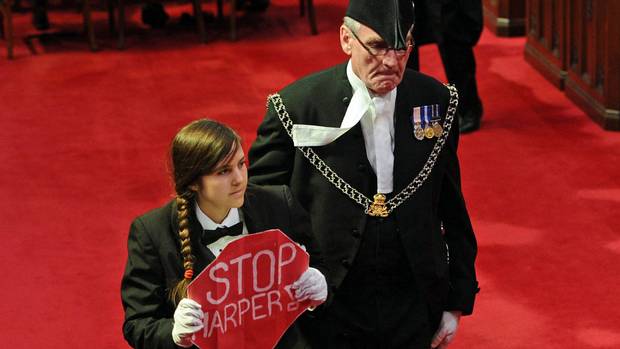[title maintitle=”” subtitle=”Harper’s campaign is embracing Islamophobia to make Monday’s parliamentary elections a referendum on the veil”]
On Oct. 9, Zunaira Ishaq, an immigrant from Pakistan, finally took her citizenship oath and became a Canadian. Her refusal to take the oath without niqab, or a face veil, has been a subject of legal battle between Canada’s courts and Prime Minister Stephen Harper’s government.
This controversy has become a backdrop for Canada’s parliamentary elections today. Having lost legal challenges that would have prevented Ishaq from taking the oath while veiled, Harper’s Conservative Party is now vowing to pursue a niqab ban during citizenship ceremonies and to consider a wider ban for all public employees if re-elected. His opponents, the Liberal Party’s Justin Trudeau and the New Democratic Party’s Thomas Mulcair, have dismissed the niqab issue as a distraction and oppose such bans.
Harper’s fear-mongering reflects Canada’s growing distance from the “respect for multiculturalism” and “freedom of religion” enshrined in its own Charter of Canadian Rights and Freedoms. A Conservative victory in today’s polls would express an endorsement of Islamophobia and a xenophobic fear of the immigrant “other.” It will also show that the country’s commitment to women’s right to choose does not extend to Muslims who wear the face veil.
Excluding Muslims
Harper’s Muslim-baiting does not end with the promise of a niqab ban. Canada’s immigration authorities hadreportedly stopped processing the resettlement of Syrian refugees unless deemed admissible by Harper’s office. The Canadian government apparently wanted to prioritize the applications of Christian Syrian refugees over those of Muslims. As a result, more than 1,000 Muslim Syrian refugees already processed by the United Nations Refugee Agency had to wait while officials try to find Christians in their stead. Canada had reluctantly admitted intervening in the resettlement vetting process but said “no decisions” had been made.
That’s not all. Following a surge in opinion polls over their pledge to ban niqabs, Conservative Party leaders announced last week plans to create a “barbaric cultural practices hotline,” which allows Canadian citizens to report their Muslim neighbors on suspicions of honor killings and child marriages. This measure, they insist, would protect Muslim women from violence.
For Harper and his allies, violence against women is only a problem when the perpetrators are Muslim men. Even as smug Conservative leaders touted the hotline, two Muslim women were targeted in Islamophobic incidents. On Sept. 29, a group of teenagers in Montreal attacked a pregnant woman, forcing her veil off and causing her to fall. A day later, another veiled woman was violently attacked at a shopping mall in Toronto in front of her two young daughters. Other Muslim women expressed similar fears: A columnist for the Globe and Mail told her editor she was “too broken to write” and that the conservative onslaught over the niqab had left her feeling like a second-class citizen.
A Canada that votes for Harper will be a scared nation capitulating to nativist political demagoguery and to the belief that Muslims can never be real Canadians.
The flawed logic of Harper’s Conservative Party is clear: Canadian Muslim women’s freedom and right to make their own decisions ends when their choices fail to align with the party’s positions. It is a shrewd construction that seeks to privilege real Canadians — whites and non-Muslims — whom it hopes to enlist via its hotline. The use of this political sleight of hand transforms xenophobia into saviordom, and racist repugnance into the self-righteous regard for Muslim women’s freedom. Muslim men, already suspect for their terrorist potentialities, must now be watched for their misogyny and their likelihood of abridging the self-expression of women.
The Conservative Party’s paternalistic leadership feels it knows what’s best for Muslim women and that it can abridge their choices because it imagines them as being perpetually in need of saving. At the core of their position is the premise that only disavowals of faith and culture, especially when they are foreign and Muslim, can be feminist acts. In their eyes, Ishaq’s insistence on her right to define her own public religious practice is not feminism at all. To everyone else, their absurd position purports to champion women’s freedom while at the same time insisting on limitations to it.
Islamophobia and elections
The fear of Muslims continues to be a feature of European elections, where far-right parties have demonized, ghettoized and disenfranchised Muslim minorities. As political theorist Martha Nussbaum pointed out in her 2013 book, “The New Religious Intolerance,” this fear-driven electoral strategy is a “narcissistic emotion,” one that focuses narrowly on the person’s own survival rather than the social good. This tactic has successfully pushed up poll numbers, provoking disengaged voters to pay attention.
This phenomenon has now become a mainstay of North American elections. As Harper’s campaign labors to turn Monday’s vote into a referendum on the veil, Republican contenders for the 2016 U.S. presidential elections are falling over themselves to win the crown for most Islamophobic of all. In both contexts, Muslims are too few in number to counter the corrosive hatred. It falls to other Canadians and Americans to do so. As Nussbaum points out, while fear may be useful in appealing to the most primitive aspect of humanity, it is not fitting for a society based the higher faculties of reflection and balance.
The deployment of fear to deny equal rights, be it to Ishaq or to the hundreds of war-weary Syrian refugees who may not be permitted entry into Canada because of their Islamic faith, erodes Canada’s commitment to democratic values. A Canada that votes for Harper will be a scared nation capitulating to nativist political demagoguery and to the belief that Muslims can never be real Canadians.
[separator type=”thin”]
This article originally appeared on Al Jazeera America
(Photo Credit: theglobeandmail.ca)





Canada is a socialist joke, who cares. Besides, white women built feminism, you should pay credit when it’s due because a lot of good women worked very hard.